|
|
|
Sort Order |
|
|
|
Items / Page
|
|
|
|
|
|
|
| Srl | Item |
| 1 |
ID:
178111
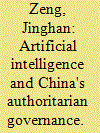

|
|
|
|
|
| Summary/Abstract |
China has adopted a proactive and strategic approach to embrace the age of artificial intelligence (AI). This article argues that China's bold AI practices are part of its broad and incoherent adaptation strategy to governance by digital means. AI is part of a digital technology package that the Chinese authoritarian regime has actively employed not only to improve public service, but also to strengthen its authoritarian governance. China's digital progress benefits from its huge internet market, strong state power and weak civil awareness, making it more competitive than western democratic societies where privacy concern restricts their AI development. However, China's ambitious AI plan contains considerable risks; its overall impact depends on how AI affects major sources of political legitimacy including economic growth, social stability and ideology. China's approach is gambling on its success in (a) delivering a booming AI economy, (b) ensuring a smooth social transformation towards the age of AI and (c) proving ideological superiority of its authoritarian and communist values.
|
|
|
|
|
|
|
|
|
|
|
|
|
|
|
|
| 2 |
ID:
145884


|
|
|
|
|
| Summary/Abstract |
Ideological campaigns in post-Deng China have a strategic function of discerning loyalties of local leaders. Previous empirical studies have found that Jiang Zemin’s followers are more likely to echo Jiang’s ideological campaigns. Through a content analysis of provincial newspapers between 2005 and 2012, this study suggests that the manner of displaying loyalties has completely changed. By employing a panel-corrected standard errors (PCSE) estimation, this study finds that protégés of both Hu Jintao and Jiang Zemin are less likely to echo their patron’s ideological campaigns, suggesting the shifting function of ideological campaigns from monitoring identified followers’ loyalties to recruiting new followers. This article argues that this is a result of changing elite politics and—more importantly—the different strategic use of ideological campaigns.
|
|
|
|
|
|
|
|
|
|
|
|
|
|
|
|
| 3 |
ID:
148471


|
|
|
|
|
| Summary/Abstract |
The rise of big data has brought with it enormous possibilities, for better or worse. In China, the government has been enthusiastically preparing for the coming of the era of big data. This article examines how the authoritarian regime in China has been employing big data to improve its governance and to move towards a ‘Big Brother 2.0’ model. The regime has combined cooptation with coercive control to exploit digital technology, in order to maximize its utility and thus maintain authoritarian rule. Moreover, existing debates on digital technology largely focus on the changing power structures between state and society, but neglect power structures within regimes and their implications for authoritarianism. This article argues that the use of massive digital data may backfire against the authoritarian regime as it may change the power structure within the state. That is to say, efforts to embrace big data may also undermine the authoritarian rule. A more accurate understanding of the Chinese authoritarian regime's resilience and vulnerability in the information age will help us grasp the essence of China's rise as a fragile global power.
|
|
|
|
|
|
|
|
|
|
|
|
|
|
|
|
| 4 |
ID:
146484
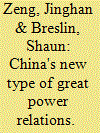

|
|
|
|
|
| Contents |
The rise of China has been reshaping how the country sees its own role in the world. China has become increasingly willing to move from being a norm and system taker to a norm and system shaper (if not yet maker). One example is Xi Jinping's promotion of ‘a new type of Great Power relations’ designed to create a strategic space in which to operate. By using a mixed quantitative/qualitative analysis, we analyse 141 Chinese articles titled with ‘new type of Great Power relations’. We find that although Chinese analysts and policy makers rejected the idea of a G2 in 2009, the mainstream discourse has rapidly shifted to what we call a ‘G2 with Chinese characteristics’ which indicates a fundamental shift in Chinese evaluation of the power status of itself and others. While some Chinese scholars consider China to have already achieved the status as the world's No. 2 or even a superpower, the mainstream discourse views China as both a Great Power and a rising power at the same time. This, we argue, moderates the expectations of what China can and should do to resolve global problems despite its great power status.
|
|
|
|
|
|
|
|
|
|
|
|
|
|
|
|
| 5 |
ID:
144323
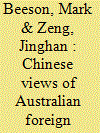

|
|
|
|
|
| Summary/Abstract |
The economic importance and strategic significance of Australia's relationship with China means that bilateral ties have become a major focus of attention in the scholarly and policymaking communities in Australia. Understandably enough perhaps, less attention has been given to the way the relationship is understood in China. This article addresses this absence in the literature by providing an overview of some of the more important contributions to the discussion in China. The most important point that emerges from such an analysis is that there is an ‘asymmetry of interest’ in the two countries, with Australia occupying a far less prominent place in Chinese policy discussions than China does in Australia. Equally noteworthy is the fact that the study of Sino-Australian relations in China is characterised by a greater variety of perspectives than it is in Australia. Appreciating this diversity is an essential part of developing a more accurate understanding of the policymaking milieu in China.
|
|
|
|
|
|
|
|
|
|
|
|
|
|
|
|
| 6 |
ID:
164829
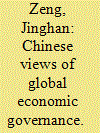

|
|
|
|
|
| Summary/Abstract |
China’s rise and America’s global retreat have made China’s role in global governance more important than ever before. By analysing Chinese (mainly academic) literature, this article studies contemporary Chinese views of global economic governance. It finds that the 2008 financial crisis is a notable point of the Chinese discourse. In addition, dialogue platforms – the G20 in particular – rather than key institutions of global economic governance such as International Monetary Fund (IMF), World Bank and Word Trade Organization (WTO) win overwhelming attention in the Chinese discourse. Chinese views of global economic governance also highly value the role of the state, while paying less attention to Non Governmental Organisations (NGO) and civil society. Overall, this article highlights a diverse, shifting and sometimes contradictory Chinese discourse on global economic governance, which helps to develop a more accurate understanding of China’s ambition in global economic governance.
|
|
|
|
|
|
|
|
|
|
|
|
|
|
|
|
| 7 |
ID:
131639
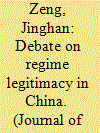

|
|
|
|
|
| Publication |
2014.
|
| Summary/Abstract |
This article identifies continuities, new trends and shifts in emphasis in the Chinese elite debate about political legitimacy by analysing 125 Chinese articles concerning legitimacy published between 2008 and 2012. It reveals a remarkable cleavage between the international perceptions of the Chinese state and the pessimistic views among Chinese intellectuals about the party's ruling. It finds that Chinese scholars often look at Western theories when dealing with the legitimacy conundrum, and rarely look at Chinese philosophy. They focus on ideology much more than Western scholars, and they are more pessimistic about performance legitimacy than the latter. Moreover, this study finds that the legitimacy concerns and policy suggestions of scholars vary significantly depending upon their research locations, institutions and funding sources. This study also finds a distinct rising appeal of social autonomy that runs counter to the dominant official line. Nowadays, value changes, socioeconomic inequality and corruption are considered to be the most perceived threats to legitimacy; ideology, social justice and governance are the leading prescriptions for the party-state. This result is vastly different from the previous study, suggesting a fundamental shift in the legitimacy debate driven by the worsening socioeconomic problems in China.
|
|
|
|
|
|
|
|
|
|
|
|
|
|
|
|
| 8 |
ID:
137465
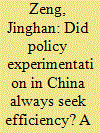

|
|
|
|
|
| Summary/Abstract |
Policy experimentation has been widely considered a ‘magic bullet’ of policy improvement and key to economic prosperity in China. This article, however, argues that policy experimentation in China does not always seek policy efficiency. Rather, it can be manipulated as a political symbol without actually affecting practices. By taking a case study on Wenzhou's financial reform, this article illustrates that local policy experimentation can serve as a mechanism for the central government to legitimately delay reform practices—in the case of Wenzhou's financial reform in 2012, out of a desire to maintain socio-economic stability during the power succession at the 18th Party Congress. In this reform, socio-economic stability was deemed more important than developing a sustainable and effective long-term policy. This article provides a new perspective on understanding policy experimentation in China by proposing the idea of ‘symbolic reforms’.
|
|
|
|
|
|
|
|
|
|
|
|
|
|
|
|
| 9 |
ID:
138345


|
|
|
|
|
| Summary/Abstract |
As China has grown stronger, some observers have identified an assertive turn in Chinese foreign policy. Evidence to support this argument includes the increasingly frequent evocation of China's ‘core interests’—a set of interests that represents the non-negotiable bottom lines of Chinese foreign policy. When new concepts, ideas and political agendas are introduced in China, there is seldom a shared understanding of how they should be defined; the process of populating the concept with real meaning often takes place incrementally. This, the article argues, is what has happened with the notion of core interests. While there are some agreed bottom lines, what issues deserve to be defined (and thus protected) as core interests remains somewhat blurred and open to question. By using content analysis to study 108 articles by Chinese scholars, this article analyses Chinese academic discourse of China's core interests. The authors’ main finding is that ‘core interests’ is a vague concept in the Chinese discourse, despite its increasing use by the government to legitimize its diplomatic actions and claims. The article argues that this vagueness not only makes it difficult to predict Chinese diplomatic behaviour on key issues, but also allows external observers a rich source of opinions to select from to help support pre-existing views on the nature of China as a global power.
|
|
|
|
|
|
|
|
|
|
|
|
|
|
|
|
| 10 |
ID:
192121


|
|
|
|
|
| Summary/Abstract |
With the growing challenges brought by Artificial Intelligence (AI)’s rapid development, multiple global AI governance initiatives have been developed to set up AI norms and standards. With China’s open ambition to be an AI superpower in 2030, China is keen to play a leadership role in nascent global AI governance regimes. This article argues that China’s search for AI leadership is driven by not only domestic regulatory needs but also the desire to gain norm and agenda setting power. China’s leadership ambition in global AI governance lies in the wider context of its aspiration to shift from a norm-taker towards a norm-shaper, if not maker. Despite considerable efforts taken so far, however, this article suggests that China is facing enormous challenges to realize its leadership ambition. The current geopolitical landscapes have allowed China limited room in nascent global AI governance regimes to demonstrate its leadership credentials. It remains to be seen how China’s role may evolve with the development of global AI governance architecture.
|
|
|
|
|
|
|
|
|
|
|
|
|
|
|
|
| 11 |
ID:
175061
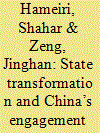

|
|
|
|
|
| Summary/Abstract |
Debates over the implications of China’s rise for global governance have reached an impasse, since evidence exists to support both ‘revisionist’ and ‘status-quo’ intentions. This means that neither is strictly falsifiable and hence the debate, as currently structured, is irresolvable. However, contradictions are explicable if we recognise that China is not a unitary state. Since the beginning of the reform era, its international engagements have been shaped by the uneven transformation – fragmentation, decentralisation and internationalisation – of state apparatuses. Contradictory international actions thus may reflect not top-down strategic direction, but conflicts, disagreements and coordination problems within China’s transformed party-state. Our state transformation approach directs us away from evaluating China’s approach to global governance in toto – whether it is overall a revisionist or status quo power – towards a detailed analysis of particular policy domains. This is because in each issue-area we find different constellations of actors and interests, and varying degrees of party-state transformation. We demonstrate the centrality of state transformation analysis for explaining the co-existence of revisionist and status quo behaviours through the apparently hard test case of nuclear technologies. Even in this ‘high politics’ domain, state transformation dynamics help explain China’s inconsistent international behaviours.
|
|
|
|
|
|
|
|
|
|
|
|
|
|
|
|
| 12 |
ID:
167687
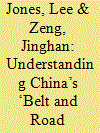

|
|
|
|
|
| Summary/Abstract |
China’s massive ‘Belt and Road Initiative’ (BRI) – designed to build infrastructure and coordinate policymaking across Eurasia and eastern Africa – is widely seen as a clearly-defined, top-down ‘grand strategy’, reflecting Beijing’s growing ambition to reshape, or even dominate, regional and international order. This article argues that this view is mistaken. Foregrounding transformations in the Chinese party-state that shape China’s foreign policy-making, it shows that, rather than being a coherent, geopolitically-driven grand strategy, BRI is an extremely loose, indeterminate scheme, driven primarily by competing domestic interests, particularly state capitalist interests, whose struggle for power and resources are already shaping BRI’s design and implementation. This will generate outcomes that often diverge from top leaders’ intentions and may even undermine key foreign policy goals.
|
|
|
|
|
|
|
|
|
|
|
|
|
|
|
|
|
|
|
|
|